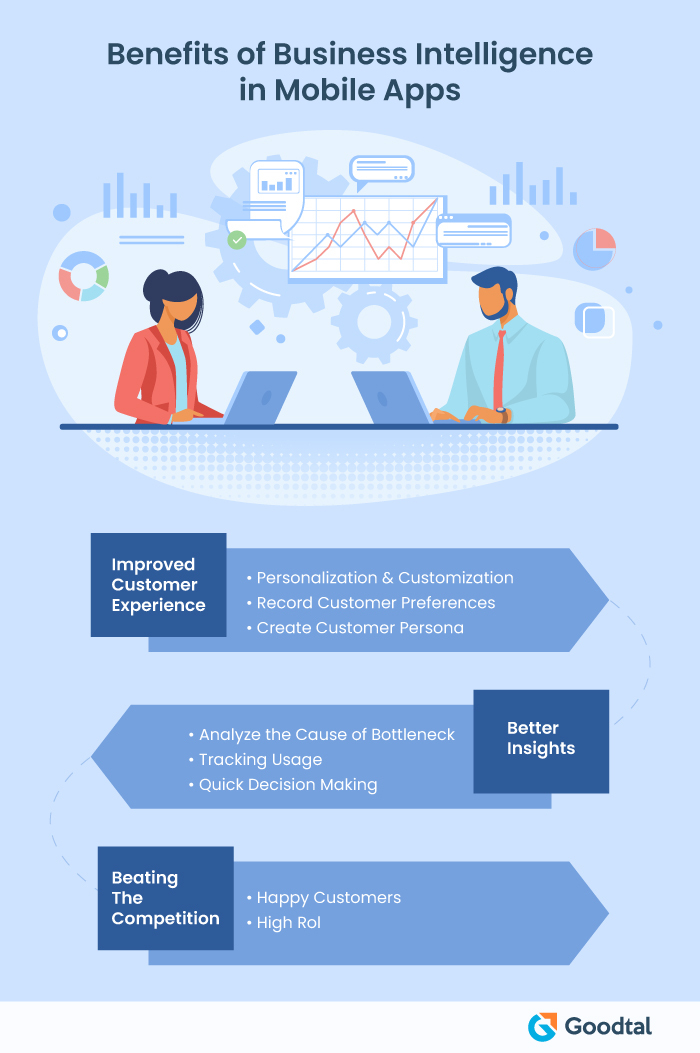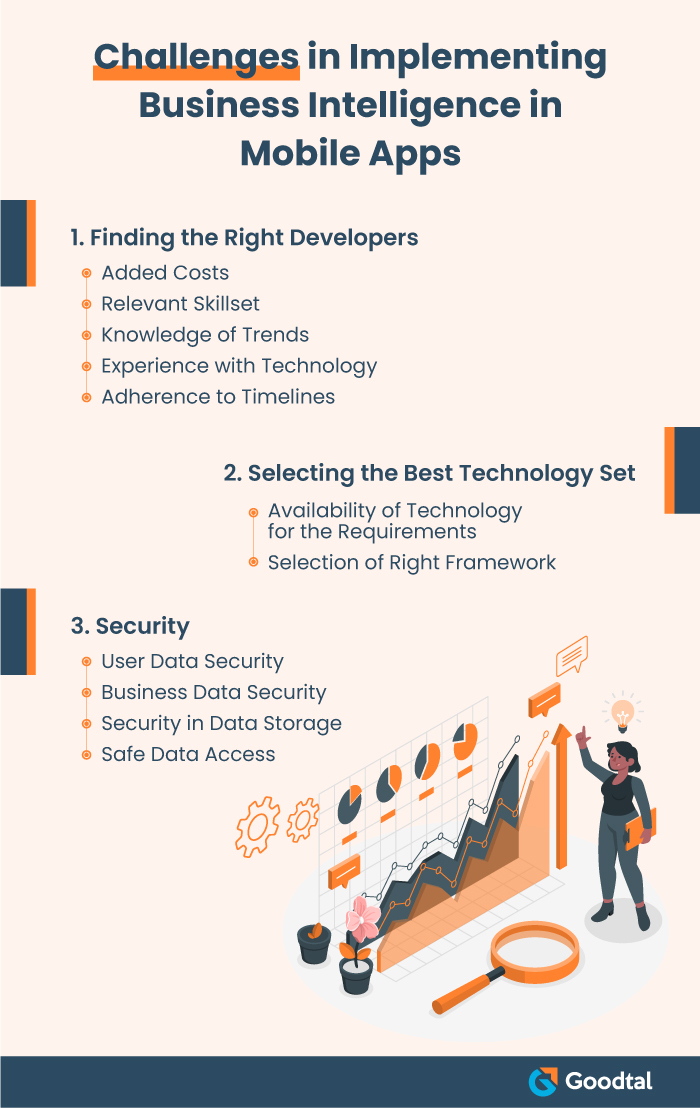
There is huge competition in the market, and businesses are struggling to make mobile apps that are more successful compared to competitors’. Due to this fierce competition, businesses must go a step further than their competitors to ensure the success of their apps.
Customer-centricity is the golden rule for app success, and so it is the area where businesses must put that extra effort. Businesses must keep themselves aware of the problems customers are facing while using the app. App usage data helps businesses determine the bottlenecks faced by the users. But is it simple to collect such app data?
With Artificial Intelligence, keeping track of customers’ app behavior is no more cumbersome. And once the app has recorded enough customer behavior data, Business Intelligence comes into the picture to help businesses offer the level of customer-centricity that can make the app a hit in the market. So, businesses are increasingly incorporating Business Intelligence into their apps. The following statistics will further convince you of the increasing use of BI.
The global mobile business intelligence market was valued at $8.8 billion in 2020 and is expected to reach $29.6 billion by 2027, at an 18.9% CAGR. (Global Industry Analysts Inc, 2021)
Even if you choose to ignore the statistics, you cannot avoid BI in apps for its benefits.
Advantages of Business Intelligence in Mobile Apps
Here are the most prominent advantages of Business Intelligence in apps.

Improved Customer Experience
The most significant benefit of Business Intelligence in mobile apps is that it facilitates an excellent customer experience. Various elements of customer experience can be implemented by integrating BI into apps.
Personalization & Customization
We are living in an era of personalization. Businesses must offer personalized services to succeed. For a personalized customer experience, businesses need comprehensive data about their customers. Using BI in apps helps keep track of user journey and record customer interactions and customer behavior on the app. Business intelligence empowers the app to offer personalized services based on the data gathered.
Record Customer Preferences
Understanding customer preferences is the first step to success for businesses. This is a time-consuming and challenging task if done by humans. However, artificial intelligence, machine learning, and business intelligence make the task easy. With BI, the results are also accurate and convincing. BI empowered app records customer data and analyzes it to gauge customer preferences. This record of customer preferences is then used to offer personalized notifications. With BI, the results are also accurate and convincing.
Create Customer Persona
Over a period, customer interactions are recorded by the apps, and a virtual profile of the customer is created for further research and personalization. This customer persona helps businesses deliver as per user requirements. For example, in an e-commerce app, if the user buys a particular size of clothing every time and is by mistake selecting a larger size once, it can alert the customer that a smaller size is recommended based on his past purchases. This can ease the customer from making mistakes and also suggests to the customer that the app is specifically catering to him. It helps businesses make their apps more and more customer-centric and successful in the long run.
Better Insights
While leading app developers believe that they have designed the best navigation, ultimately, it is the customer who decides whether the app navigation is good enough for them to continue using the app. If they are not comfortable with the app, they uninstall it. It takes them hardly any time to switch to a more comfortable app of the competitor. And many of them do not even leave a review or feedback that can suggest to you the reasons for app abandonment or uninstall. It becomes necessary to track blocks or bottlenecks in the user's app journey in such a situation.
Analyze the Cause of Bottleneck
Business Intelligence offers customer and usage insights for the apps. It also helps detect blocks in user navigation throughout the app usage. Businesses can then plan notifications to allow the user at the relevant stages. Tracking customer journey and app interactions also give significant insights into the app's shortcomings that could not be perceived during development or testing. Recording this data and then using business intelligence gives businesses a precise idea of what is causing app abandonment or uninstall. Business Intelligence can suggest what needs improvement and even how to go for it. Once identified, app bottlenecks can be corrected and released as further app updates.
Tracking Usage
BI in apps helps businesses track and analyze the app traffic, bounce rates, engagement on different sections, and more. This data is crucial to gauge customer loyalty and reach. With this data, businesses can plan their marketing campaigns better. They can also develop push notifications and alerts to keep the customer engaged.
Quick Decision Making
Business Intelligence helps businesses make quick and effective decisions. The BI data is based on facts, figures, and accurate analytics. It is generated after thorough analysis and incorporates experience from the past. Without BI, the managers would have to spend heavily to hire external experts to reach valuable decisions. Most decision-makers do not have so much time. Particularly when it is about app users who are using apps regularly, any decisions have to be made and implemented quickly. For example, offering seasonal discounts based on customer preference, wishlists, and during seasonal fluctuations in demand is a smart decision that can be offered and implemented instantly through the app empowered with business intelligence.
Similarly, offering app notifications or help to the user when a technical or logical glitch is detected has to be quick. Only Business Intelligence can enable such speedy decision-making and actions in real-time.
Beating the Competition
Businesses must offer better services than their competitors to survive in a competitive market with numerous apps added to the app store every day. The first step for making your app successful is conducting market research about the apps in similar domains, their features, reviews, and pros and cons. Business intelligence helps analyze research data to give insights about competitor apps, the reasons for their success, etc. It also provides analytics about the reasons for the failure of similar apps. The data thus generated can be used to devise ideas on the haves and have-nots in the apps.
Happy Customers
A successful app wins the competition and leads to better customer reviews, feedback, and referral. No matter how much technology you have used or the number of features incorporated into the app, the app's success still depends on customer acceptance. If the customers are happy with your app and find it more satisfying than the competitor’s app, you have won the game. So, businesses must leverage BI's power to make the app more interactive and customer responsive.
High RoI
App development is expensive, and you don’t know whether you will get a return on your investment till your app succeeds in the market. BI can help make the app more engaging and interactive during use. When customers start loving your app, and your app achieves its share in the market, you start getting returns on your investment. As app engagement increases, it paves the way for the effective monetizing of the app. Overall, businesses can derive high RoI with BI-enabled apps, and no business would want to miss that chance.
Challenges in Implementing Business Intelligence in Mobile Apps
As you read through the benefits of implementing BI in your app, you are convinced that you want to go for it in your app. However, implementing BI in apps does come with its challenges. And, businesses must prepare for these!

Expertise
Business intelligence is added to mobile apps as a set of features and functionality. It is a complex task, and effective integration of BI must be done by the best mobile app developers. Amateur developers will have to put more time and resources and still won’t be able to get the desired results.
Experienced mobile app developers are capable of building apps with excellent business intelligence features. Such apps capture and filter the right data to put into use for analytics. This data is converted into effective decisions for the growth of the business.
Security
Integrating BI in the app does not automatically ensure data security. The biggest challenge in implementing BI for mobile apps is the security of user data and business data. It is crucial to get your app developed by the leading mobile app developers who have enough experience and expertise to develop apps that ensure effective BI with data security.
Wrapping Up!
Business Intelligence is now an integral part of conducting business effectively, and it has made its place in mobile apps. Different industries have different requirements for BI in mobile apps. In ecommerce, the BI needs in apps are comparatively simple. But, financial or banking apps require insights and BI of a very high level. Thus, developing specialized and complex BI-empowered apps is also challenging.
Despite challenges, there is huge competition in developing the best business intelligence-powered mobile apps as experienced developers can overcome such challenges easily. The top mobile app development companies can effectively integrate BI into mobile apps. So, if you are looking for the perfect mobile app developers for your next mobile app development project, Goodtal is here to help!
